Advertisement
Old Master: Bread And Puppet's Radical Political Theater At 50
Last Sunday afternoon, hundreds gathered on a hillside in Glover, Vt., in anticipation of the start of Bread and Puppet Theater’s show. Below in the sun-baked field, a brass band, dressed all in white, kicked into rollicking high gear for the French tune they call “Petit Paso,” heralding the beginning of the “Total This & That Circus” (pictured above).
It was the last circus of the summer marking the 50th anniversary of Peter Schumann founding the influential but still rather underground radical, political, experimental puppet, mask and pageantry theater. Or as they put it on broadsides: “Celebrating 50 years of sublime arsekicking puppetry.”
The company motors south in its flower-decorated bus to offer free outdoor performances of the circus on Cambridge Common at 3 p.m. Sunday, Sept. 1, and at the Bread & Roses Festival on Campagnone Common in Lawrence at 4 p.m. Monday, Sept. 2.
The company then performs at Boston College to cap off “Fifty Years Bread and Puppet: Cheap Art and Political Theater,” a daylong symposium there on Saturday, Sept. 14.
“There hasn’t really been an academic study of Bread and Puppet. Rather than wait for someone else to do it, we thought we could do it,” says organizer John Bell, the director of the University of Connecticut’s Ballard Institute & Museum of Puppetry who has performed with Bread and Puppet since 1973.
The anniversary occasions a kind of accounting. What is the theater’s legacy? What remains to be done?
Some close to the theater say this year’s edition of the circus is more sober, a reflection of Schumann taking a stronger hand in directing the show, a production he usually molds from acts proposed by numerous collaborators.
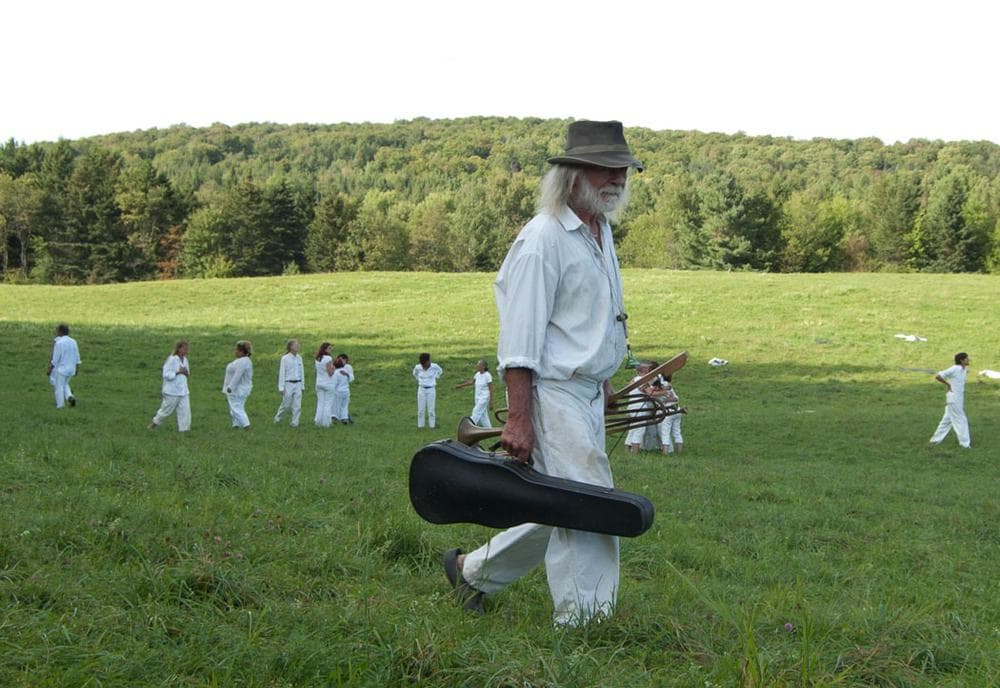
There are signs that the gray-bearded 79-year-old is growing more physically cautious—over the past year or so he’s retired from his long tradition of appearing at the end of the circus dancing atop 15-foot-tall stilts. But there seems to be an added sense of seriousness and urgency about his activities this summer, perhaps a reflection of a master trying to get as much done as he can with the limited time he has remaining.
Still the circus retains Bread and Puppet’s signature brew of political satire, poetic tableaus, and vaudeville clowning. Stilters ride atop fabric and papier-mâché zebras. Giants of the “99 percent” confront “corporate dwarves.” A (literal) whistle blower emerges from the intelligence community. The dead of our war in Afghanistan are remembered. Plans for an oil pipeline across Vermont are criticized. A song is sung to honor “the courageous soldier Chelsea Manning, who got 35 years in prison for telling the truth.” Fighter planes face off against a fabric ship flying daffodil sails and flags. Papier-mâché rhinos, tigers, horses, butterflies, sheep, crows, cows and chickens dance.
The theater’s influence is profound. One example: the giant puppets that routinely appear at public protests are descendents of Bread and Puppet—often directly because company alums have started their own theaters around the world. Another example: Bread and Puppet alum Julie Taymor adapted her knowledge of puppets to create the Disney’s hit Broadway show “The Lion King.”
But asked about the company’s influence, Schuman answers, “Nothing whatsoever. Very obviously you don’t influence those politics. They go their way and you may be wiggling against them and you may be running and screaming and excite your neighbors to do the same. But that’s about it. That’s the effect. Then some of what one does that way may change some people’s minds, that’s the best you can hope for. Revolutions aren’t easy. And revolutions are preceded by cultural revolutions, which means that people start reflecting on their way of life and understanding that it is not possible to live that way. And that’s what cultural workers hope for, that they hit people in the guts.”
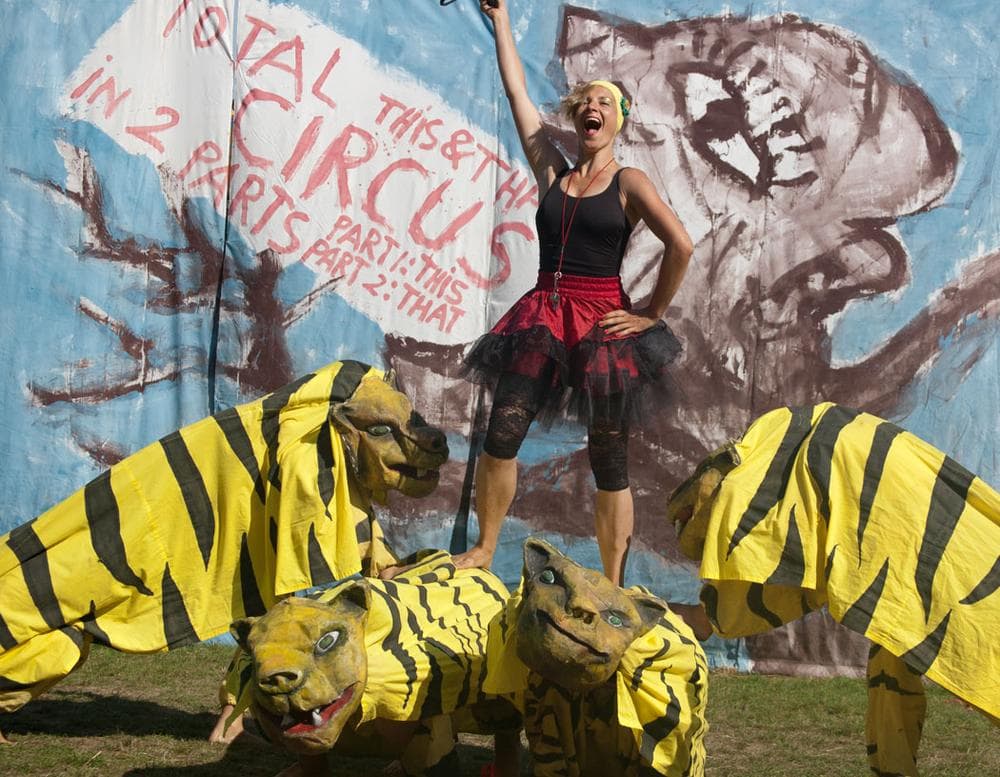
After a morning of outdoor circus rehearsals in Glover on Saturday, a small crowd of puppeteers gathers in the loft of the company’s central farmhouse and workshop for a screening of archival Bread and Puppet performance footage organized by puppeteer Adam Schutzman.
Bread and Puppet originated as one of the landmark New York experimental theaters of the 1960s, identified by their trademark giant papier-mâché puppets and their tradition of distributing fresh baked bread free to audiences at the end of performances. “Cheap art” was their motto and dance was at the center of the work. The company was founded in 1963 by Schumann, a German immigrant who witnessed the destruction of World War II as a boy and then immigrated to New York, where he studied in the same John Cage-influenced dance workshops that spawned the avant-garde “pedestrian” styles of the Judson Dance Theater.
Bread and Puppet made their name with theatrical spectacles and street protests against poor housing conditions, the Vietnam War, nuclear weapons (Schumann organized thousands to lead the June 12, 1982, Disarmament Parade in New York City), and the United States’ involvement with torturous regimes in the Americas. The company vividly merged radical ‘60s theater with the alchemy and magic of traditional ritual, public pageantry and folk art.
In 1970, Bread and Puppet moved to the mountain valleys of northern Vermont, where it produced "Our Domestic Resurrection Circus," a two-day outdoor festival of serious puppet shows, satirical circuses, and poetic pageants featuring casts of hundreds annually through 1998. Attendance each year grew to as much as 30,000. But after a man was killed in an encampment surrounding the event, the festival was broken up into smaller performances each weekend in July and August to keep things more manageable. Subjects of the past decade include Sept. 11, the wars in Iraq and Afghanistan, torture, Israeli treatment of Palestinians.
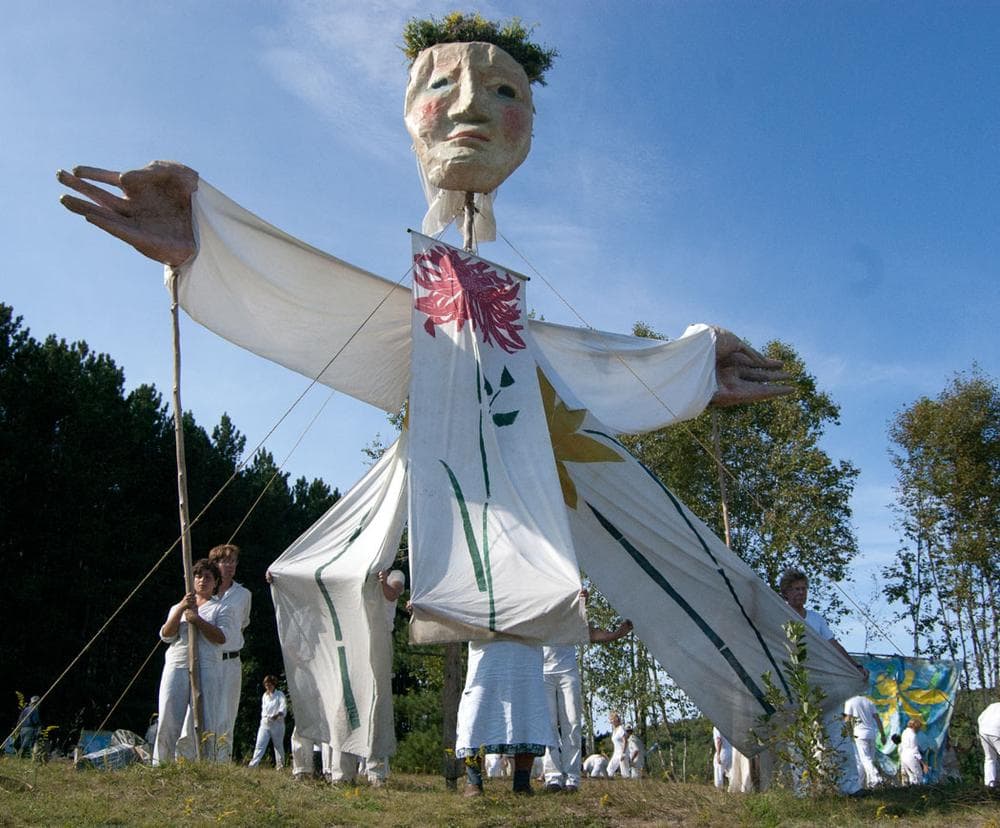
Bread and Puppet is a theater of tableaus, and its history comes back as a series of visions: a spiky-headed warrior gone berserk and striking down a whole community; ships sailing across open fields; a giant skeleton Death riding a giant skeleton horse down New York’s Fifth Avenue; people atop motorcycles and school buses waving flags as they emerge from the woods and speed across the field to begin the circus; giant kite-like birds flapping across fields; a headless giant walking with carefully determined steps; the World Trade Center assembled out of people and struck by an airplane made of people.
On Saturday, Schutzman screened footage of a proto-Bread-and-Puppet show dating to around 1962. Schumann cranked a scroll of paintings of roughly-rendered kings, menacing canons, masses of people, and parades of animals. Already here is the subject and style that Schumann would pursue for the next five decades. Over and over, he comes back to a version of this story: Many, many, many little people get hurt as “terrible kings” go to war with each other for one reason or another and “the countryside burns.”
Somewhere underneath, you sense the boy Schumann enduring the bombing of Europe. The show’s kicker: “And God looks down from heaven and he thinks they were all stupid.”

The Sept. 14 Boston College symposium “Fifty Years Bread and Puppet: Cheap Art and Political Theater” attempts to put this all in perspective.
The morning will feature presentations by scholars from Northwestern University, Reed College, Harvard, Goddard College, and Central School of Speech and Drama in London. In the afternoon, Adam Schutzman screens old Bread and Puppet footage; past and present members of the company discuss how the theater develops its shows; and artists who’ve worked with Bread and Puppet—from visual artist Kiki Smith to satirist and solo performance artist Paul Zaloom to media activist Dee Dee Halleck—talk about how the theater has influenced their work.
In the evening, Schumann delivers one of his part-rant, part-poetry, part-song “Fiddle Lectures”; frequent Bread and Puppet collaborator, the Second Line Social Aid and Pleasure Society Brass Band, plays; Bread and Puppet performs “The 50 Years Cabaret”; and Schumann talks with John Bell.
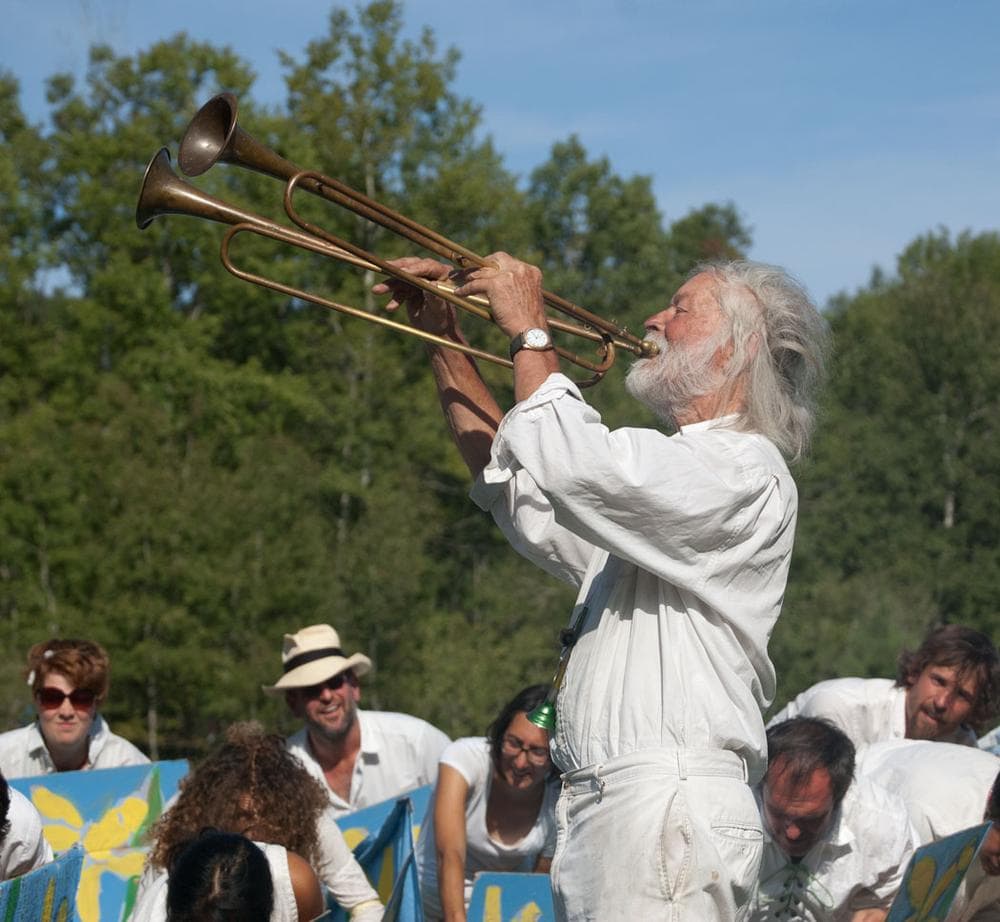
The “Cabaret” is a rare revival of four short works spanning the company’s history. “Dead Man Rises” is a quiet 1967 fable about a woman who revives a deceased guy. It’s performed in a style inspired by traditional Japanese Noh dance drama. (Update: The theater has changed its program, swapping out "Dead Man Rises" and replacing it with the 1960s show "King Story.") “A Man Says Goodbye to His Mother” is a 1960s parable about a man going off to fight in “a country far away” (read Vietnam). “The Foot” was developed, Bell says, to be performed on the streets of New York during the 1982 anti-nuke march. It concludes: “Protest and survive!” “President and Chair” from 1992 features a president blathering about how great the country is as people go cold and hungry.
Bread and Puppet’s artistry, sophistication and influence should earn it a place in the academic canon, but it has been in large part overlooked.
“I feel like people don’t write about Bread and Puppet that much because mainstream historians don’t have a way to think about puppet theater,” Bell says.
Perhaps its mix of puppetry, sculpture, dance, music and avant-garde theater don’t fit neatly into academic categories. Perhaps it is mistakenly thought of as something of a hippie relic of the ‘60s or something just for kids, rather than an active experimental theater.
Whatever the reasons, the symposium brings up the complicated question of how to fit a theater that has long situated itself politically, aesthetically and physically outside the academy into today’s scholarship. How do you bring Bread and Puppet into a canon that the theater itself would often seem to reject?
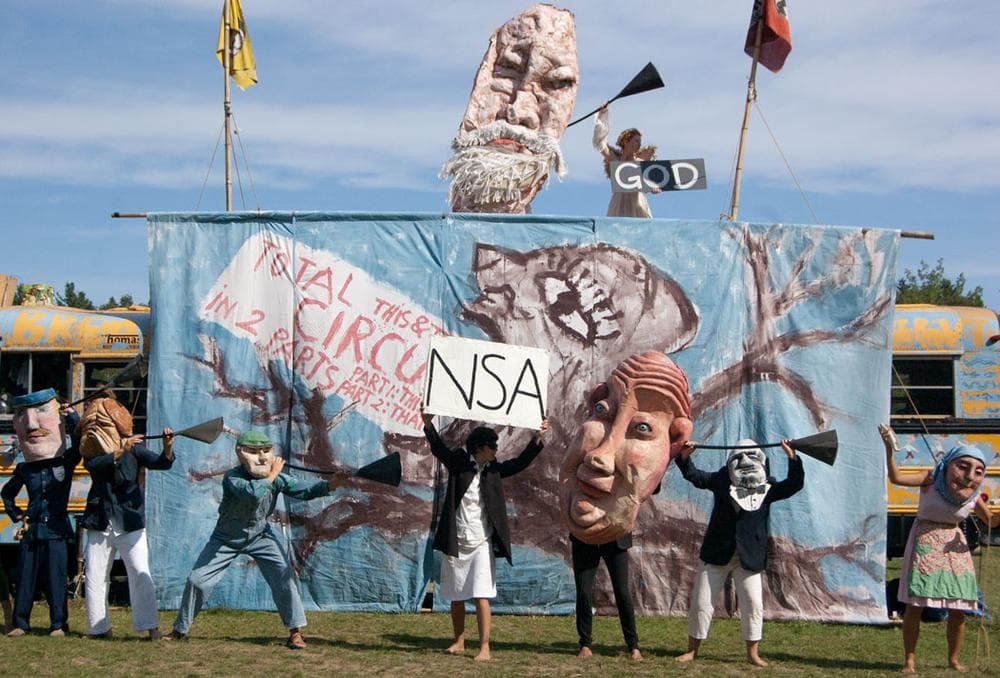
This article was originally published on August 28, 2013.
This program aired on August 28, 2013. The audio for this program is not available.
